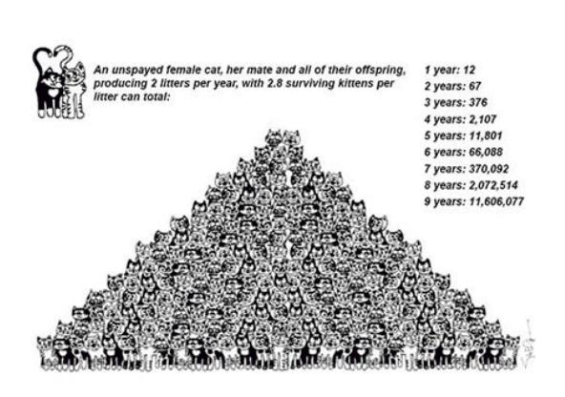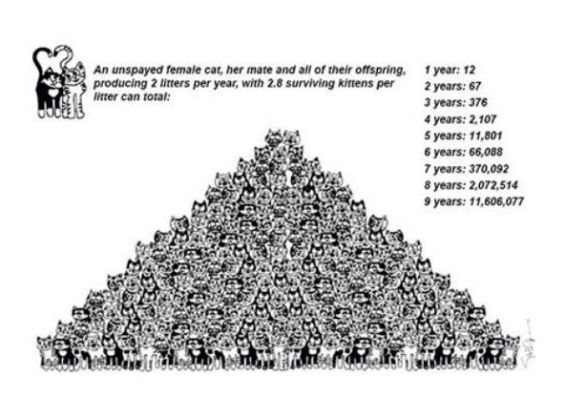As a group of dedicated volunteers; our wish is to create a safe environment for an entire colony of cats and their kittens by raising funds for medical care and spay/neuter surgery. This is a unique situation in that, ordinarily, after being spayed/neutered,
feral cats are returned to the exact area from which they were trapped, this is not possible for these cats. Unfortunately, the current location of this colony has proven to be a hostile environment resulting in the death of several members and injury to
several others.
York Region Change for Ferals is an initiative run solely by volunteers who work tirelessly within the community to help stray and feral cats as well as educate the public on the importance of having pets spayed and neutered in
order to reduce overpopulation – an epidemic, which, unfortunately, results in abandonment or euthanasia of far too many cats. The growing number of stray and feral cats in residential areas is considered a ‘nuisance' by local citizens. Ignoring the situation
will not make it go away and as we do nothing the number of stray and feral cats continues to increase.

TNR (trap, neuter, return) is a proven method for eliminating nuisance behaviours which also considers the health and well being of the cats. Once a colony has been spayed and neutered fighting and howling - the result of mating behaviour, accompanied by the foul odor of unneutered males spraying to mark their territory, are eliminated. The Trap Neuter Return process is not about rescuing cats per say; it's about controlling the population and reducing the number of feral cats in the area by stabilizing numbers in current colonies and preventing new litters. Before TNR was widely established, removing and euthanizing the cats was often practised. This is not only inhumane, it is also expensive and is not a lasting solution. The colony was established in the location for a reason; natural food source and shelter, therefore, new stray and feral cats will be drawn to the area once a colony is removed starting the cycle all over again. When widely practised, TNR has been proven to reduce the number of orphaned or abandoned kittens and cats dropped off at local shelters. This results in lower shelter and animal control costs and of course, euthanasia rates. As a result, cats already in the shelters have more chance of being adopted.
Although it is possible to find homes for some of the younger and less fearful older kittens, rescue efforts in the majority of cases are futile given the staggering numbers and manpower required to attempt the process of rehabilitation and socialization of some of the tamer adult cats. The word feral is taken from the Latin word fera, meaning wild animal, therefore, the true feral cats are highly unlikely to ever be socialized enough for adoption although they often become comfortable enough to come close to caretakers who feed them on a daily basis. Squirrels and chipmunks can become comfortable enough to be fed peanuts by hand but this does not mean they are socialized. Through TNR balance and safety are created for the colonies, and the colonies provide natural rodent control within our communities.
The term ‘Trap, Neuter and Return' is preferred to ‘Trap, Neuter and Release' or ‘Trap, Neuter, Relocate' as the prior describes a process in which colony members are returned to their respectful area – familiar territory, and group. A colony is an established family, working together to hunt and provide protection for each other. They guard their colony against unneutered cats coming in thus starting another cycle of problems - including overpopulation. Relocation is not ideal as it is difficult to integrate new cats if they are accepted into a new colony at all. To drop a cat off in a foreign area is like sending a person to a different planet. With predators such as fox and coyotes appearing in suburban areas, the chances of survival, for abandoned cats working alone, are slim. Relocation of colonies is only done in extreme circumstances such as the situation with the King Colony.
Why is this project important?
This particular situation is the result of ‘hoarding.' The immediate dangers are; kittens being removed from mothers – serious injuries and deaths are occurring as a result. A proposal for a new development in the area has been submitted to the town, which means the house is being considered for demolition. Regardless, the building is located near a main intersection which sadly, has claimed the lives of several cats and kittens from this colony already.
How will York Region Change for Ferals make a difference?
Our volunteers will work together to trap all members of the colony safely and transport them to clinics for surgery, vaccinations and other necessary medical care. They will then be taken to a safe place to be cared for while they recover before being relocated to an area where they will have basic shelter, be monitored and fed daily.
Several orphaned kittens rescued from this colony have already found wonderful forever homes and others are in foster care until they are old enough to be adopted. One kitten was rescued at 3 days of age and thankfully, another nursing mom accepted him as one of her own. He is now about five weeks old and doing so well. 
How can you help?
Volunteers working non-stop to monitor this situation and intervene when necessary (if possible) to rescue kittens in danger. As soon as we have the funds for the spay/neuter surgery, and medical care, it is our intention to trap them all at one time. Due to the situation we may only have access to the property one time for the purpose of trapping, therefore it is vital that we know we have the funds in place to care for these cats prior to trapping. Trapping and relocating them without spaying/neutering is not an option as we may never be able to trap them again to spay/neuter later.
The biggest challenges are:
Funding – even with the reduced prices at the OSPCA spay/neuter clinic, surgeries for at least 15 cats comes with great cost. Many of these cats also require additional medical care for sickness and injury. Please donate to this cause which will not only save the lives of this colony, but by cutting down on overpopulation the lives of many cats waiting in shelters for a loving home may also be saved. Sadly, millions of cats and dogs are put to sleep each year due to overpopulation.
Education - Spread the word; share the message of the importance of having pets spayed and neutered. Have you noticed a colony in your area? Learn how you can help and access available resources by registering for the Feral Cat Caretakers Workshop run by the Toronto Feral Cat Project: http://www.feraltoronto.com/ Neighbours working together can restore balance within communities.
To find out more, please check out our website and facebook page.



